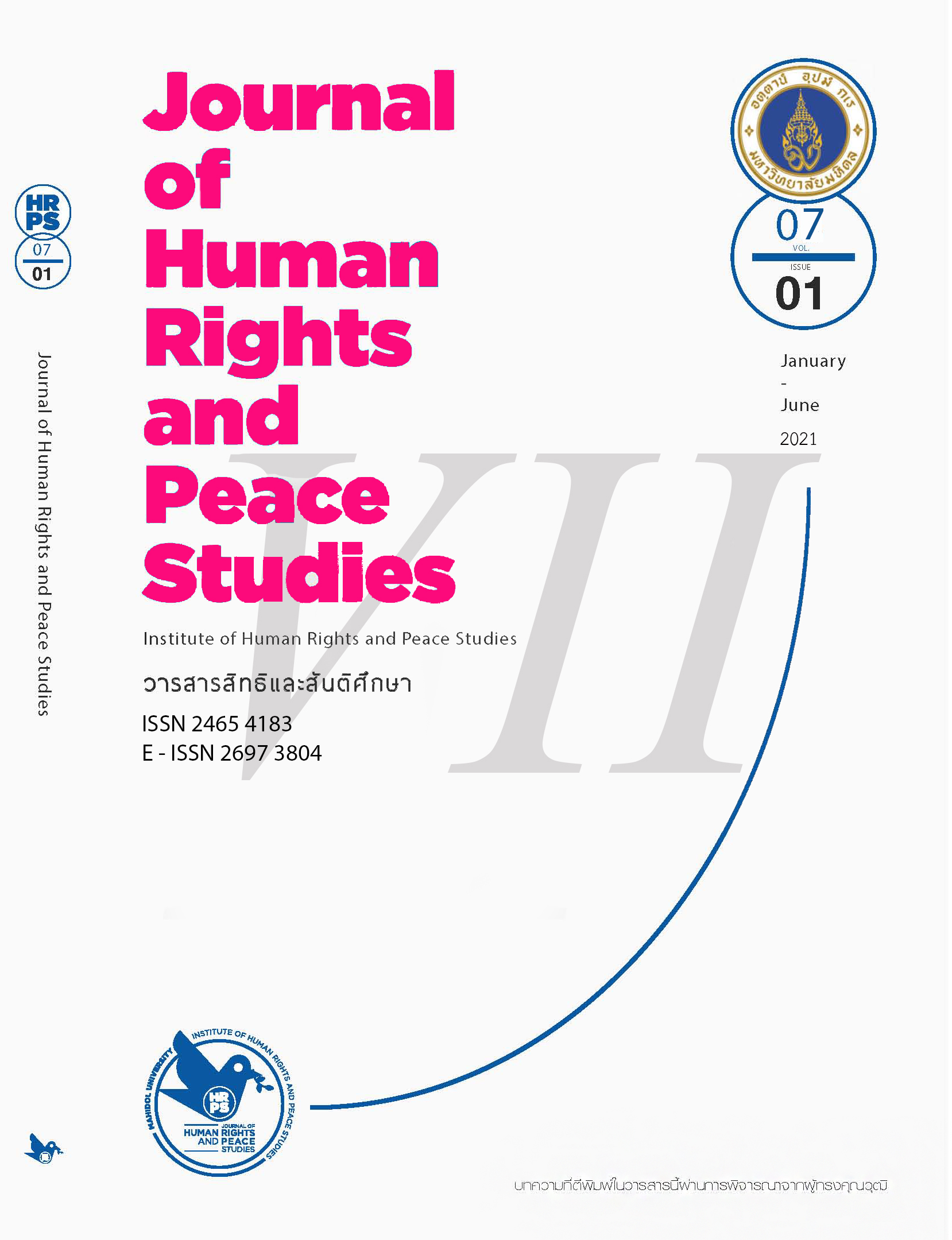Preliminary Study on The Feasibility for Constructing Peace Community Index in Thai Society
Main Article Content
Abstract
peaceful community measurement is complicated and needs interdisciplinary integration. This article, therefore, uses the concept of negative peace and positive peace to combine with three concepts of violence namely direct violence, structural violence, and cultural violence. Also, the literature review has multi- dimensions relating to human well-being. The researcher reviews both international and Thai relevant to obtain the body of knowledge of peace studies that have some differences between the global studies and the community studies. Also, obtain the components or key- indicators of basic peace-community index that is appropriate to Thai society. The suggestions for indexing peace-community index, that is fitting with Thai society, include having a concise definition of peace, integrating multi-indicators as well as having clear criteria for selecting them, also collecting data in both primary and secondary levels, and rational choosing a pilot area for peace measurement.
Article Details

This work is licensed under a Creative Commons Attribution-NonCommercial-NoDerivatives 4.0 International License.
The views, opinions, and pictures expressed in this journal are those of the authors and do not necessarily reflect the opinions and viewpoints of the editor and the editorial board. All rights are reserved by the authors and the Institute of Human Rights and Peace Studies of Mahidol University. No part of this journal may be reproduced, stored in a retrieval system, or transmitted in any form or by any means without the prior permission in writing from the journal’s editor, or as expressly permitted by law, or under terms agreed with the appropriate reprographics rights organization. Non-commercial use of information in this journal must be properly referenced.
References
Barash, D. P. & Webel, C. P. (2018). Peace & conflict studies. Sage.
Capland, R. (2019). Measuring peace: Principles, practices and politics. Oxford University Press.
Dhammahaso, H. (2015). Čh āk mūbān sīn hā phatthanā sū kān penton bǣp mūbān chō̜ saʻāt [From 5 Precepts Village to Chorsaard Village]. https://www.mcu.ac.th/article/detail/378 (in Thai).
Firchow, P. (2018). Reclaiming everyday peace. Cambridge University Press.
Galtung, J. (1996). Peace by peaceful means: Peace and conflict, development and civilization. International Peace Research Institute Oslo; Sage
Good Governance for Social Development and the Environment Institute. ( 2017). Khrōngkān prapprung datchanīkhwām yū yen pensuk rūam kan nai sangkhom Thai [Green and happiness index revision project]. Propose to The Office of the National Economic and Social Development. (in Thai).
Ingkasit, R. (2019, May 27). Datchanīkhwām suk thāng sētthasāt kāonārư̄ wā maomāi?[Happiness index of economics: Progress or regress?]. The Momentum. https://themomentum.co/does-gnh-work/. (in Thai).
Institute for Economics and Peace. (2019). Positive peace report 2019: Analysing the factors that sustain peace. Retrieved from https://www.visionofhumanity.org/wp-content/uploads/2020/10/PPR-2019-web.pdf
Institute for Economics and Peace. (2020). Global peace index 2020: Measuring peace in a complex world. Retrieved from http://visionofhumanity.org/indexes/global-peace-index/
Institute for Justice and Reconciliation. (2013). SA reconciliation barometer survey: 2013 report. https://www.ijr .org.za/portfolio-items/reconciliation-barometer-survey-2013-report/
Institute for Justice and Reconciliation. (2019). SA reconciliation barometer survey: 2019 report. https://www.ijr .org.za/portfolio-items/sa-reconciliation-barometer-2019.
Khonthai Foundation. (2020, February 22). Datchanīkhwāmpen tham nai sangkhom khrư̄angmư̄ chī wat khwāmlư̄amlam nam mās ū thāngʻō̜k dai yāngrai? [“ Social Justice Index”, a tool to measure inequality How to lead to a solution?] http://khonthaifoundation.org/th/ดัชนีความเป็นธรรมในสั/
King Prajadhipok’s Institute. (2019). Kēn tūa chī wat pramœ̄n ʻongkō̜n pokkhrō̜ng sūan thō̜ngthin phư̄a khao rap rāngwan phrapokklao pračham pī 2562[Assessment Criteria “King Prajadhipok's Institute Award 2019”]. King Prajadhipok’s Institute https://www.kpi .ac.th/media/user/files/pdf/kpi-award2019/_-simiDoc.pdf (in Thai).
King Prajadhipok’s Institute. (2012). Santisuk kœ̄t khưn dai phro̜tǣktāng yāng khaočhai[Report of Advanced Certificate Course in Promotion of Peaceful Society]. King Prajadhipok’s Institute. https://www.slideshare.net/tarayasri/new-25910175 (in Thai).
King Prajadhipok’s Institute. (2020). Wēthī thalǣng phonlakā rasamrūat khwāmkhithen khō̜ng prachāchon tō̜kō̜ra būan kān santiphāp čhangwat chāidǣn phāk tai (Peace Survey) khrang thīhā[Peace Survey 2019]. King Prajadhipok’s Institute http://kpi.ac.th/news/gallery/data/768 (inThai).
Ministry of Social Development and Human Security. (2018). Rāingān khwāmmankhong khō̜ng manut prathēt Thai 2559[Human Security Report of Thailand 2016]. ( in Thai).
Pratheuangrattana, C. & Lounkaew, K. (2019). Phatthanātūa chī wat læ wat radap santiphāp nai sangkhom Thai [Thai Peace Index]. The office for Peace and Governance, King Prajadhipok’s Institute. (in Thai).
Ramsbotham, O., Woodhouse, T., & Miall, H. (2011). Contemporary conflict resolution.(3rd ed.). Polity Press.
Rathamarit, N. (2013). Bǣpr īan phư̄nthān pratyāČh īn bōr ān [Basic Textbook of Ancient Chinese Philosophy]. Thammada Press. (in Thai).
Somphong, T. (2012). Kān sangkhro̜botrīan phư̄a kānphatthanāprachāthipatai chumchon[The Synthesis of Lesson for Develop Democracy in Community].King Prajadhipok’s Institute. (in Thai)
The Legatum Institute Foundation. (2019). The Legatum prosperity indexTM: A tool for transformation2019.https://www.prosperity.com/download_file/view_inline/3690
United Nations. (n.d.). Global indicator framework for the Sustainable Development Goals and targets of the 2030 Agenda for Sustainable Development. https://unstats.un.org/sdgs/indicators/Global%20Indicator%20Framework%20after%202021%20refinement_Eng.pdf
Vajirakachorn, S. (2010). Khunnaphāp sangkhom: Čh āk Yurōp sū prathēt Thai [Socialquality: From Europe to Thailand]. Journal of Social Development, 12(1), 15-44. https://so04.tci-thaijo.org/index.php/jsd /article/view/31290. (in Thai).
Wattanapradith, K. (2018). Chumchon santisuk nai Phutthasatawat thī yīsiphok: Thō̜t botrīan chumchon santisuk nai phư̄nthīthī mīkhwāmkhatyǣng [Peace Community in The 26Th Buddhist Century: Knowledge Learned From Peace Community in Conflict Areas]. .Journal of MCU Peace Studies, 6(sp.1), 13-24. https://so03.tci-thaijo.org/index.php/journal-peace/article/view/113138 (in Thai).


